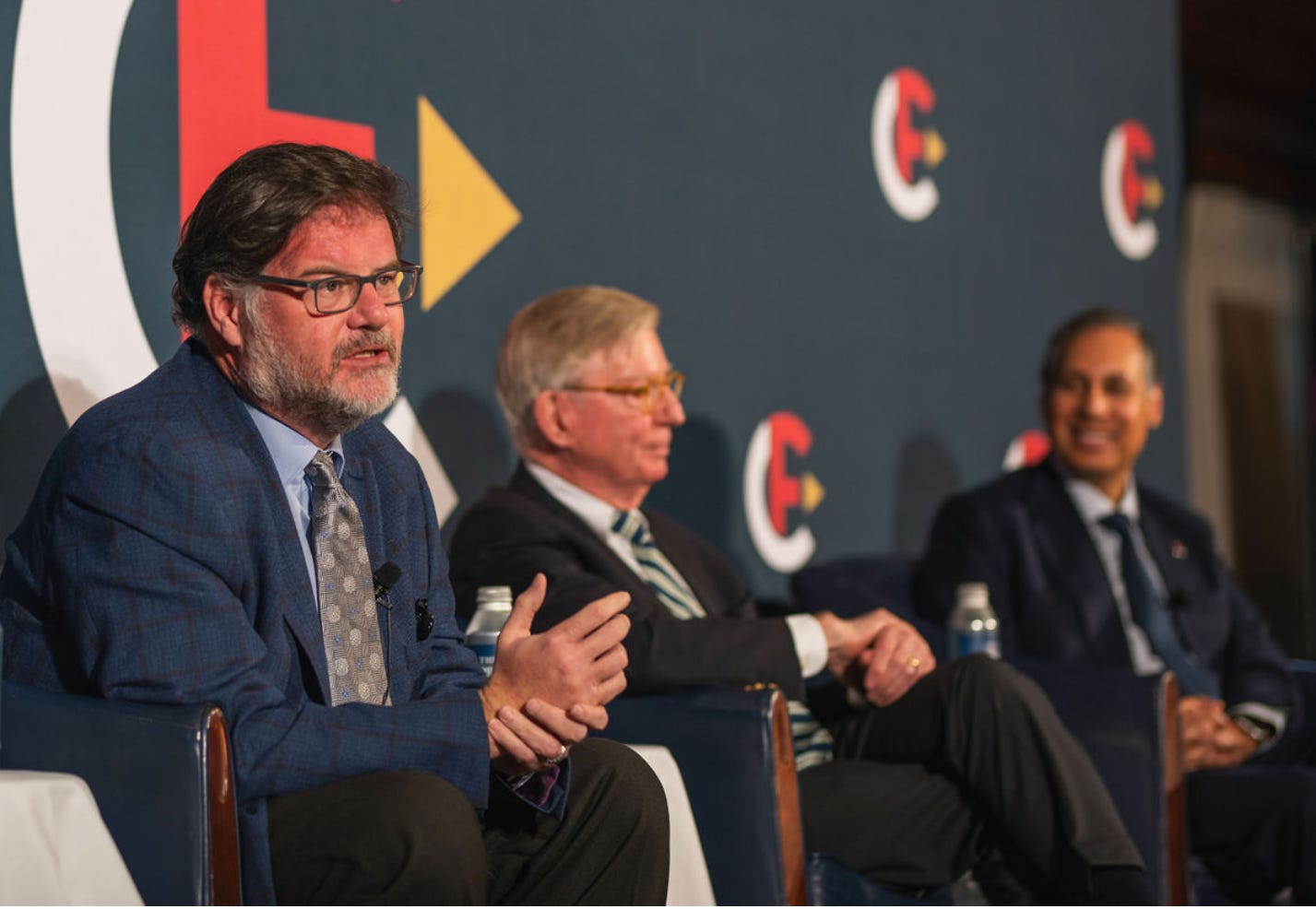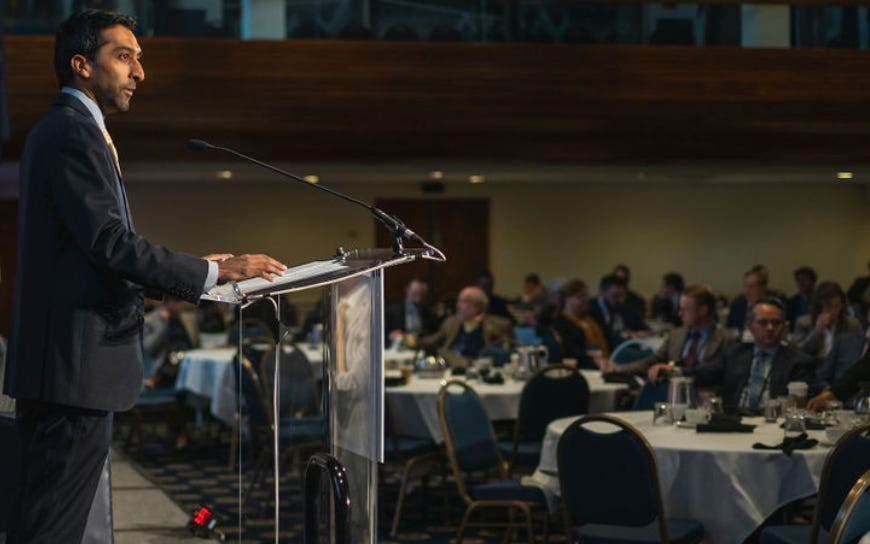Smash hit
FreeCon 2025 drew capacity crowd to discuss conservatism’s future
When the organizers of the Freedom Conservatism project began planning our debut event — FreeCon 2025 in the nation’s capital — we didn’t know what to expect.
Although the Freedom Conservatism Statement of Principles has attracted hundreds of signatories and millions of media views and listens since its release in July 2023, we couldn’t be sure a significant number of conservative leaders, activists, donors, and policy professionals would attend a face-to-face event to discuss it
Now we know. FreeCon 2025, held on Feb. 24, drew a capacity crowd to Washington’s National Press Club. Enthusiastic and engaged throughout the day, participants told us later how much they enjoyed the speakers and panels.
“Excellent conference!” raved one attendee who flew across the country to be there. “So glad I came!” Several others confided to us that they left FreeCon 2025 with a restored hope for America’s future.
In future posts, we’ll summarize the panel discussions and link to some of the news coverage of the event. Today, we offer excerpts of remarks by two of the project organizers, Avik Roy and John Hood, as well as FreeCon signatory Akash Chougule of Americans for Prosperity, one of the event sponsors.
What time is it?
Avik Roy, founding president of the Foundation for Research on Equal Opportunity, kicked off the conference by describing the goals of the FreeCon project.
“There’s been a boomlet of pundits arguing that the cause of freedom is lost,” he said, “that it’s time for conservatives to give up on limited government and instead use the power of the state to ‘reward our friends and punish our enemies.’
“Well, those pundits don't seem to know what time it is.”
Noting the initial progress of Elon Musk’s Department of Government Efficiency and the rightward shift of popular influencers such as Joe Rogan, Roy pointed out that for all its challenges, the United States still outperforms most peer countries in growth and dynamism.
“Did you know that the GDP per capita of the United Kingdom is now lower than that of the poorest state in the United States?” he asked.
“Look at China. There are a lot of people among our competitors who believe that we need to imitate China, that we have to become more like China.
“I'm not a buyer of that stock . . . China is teetering on the brink. Their economy has been incredibly overinflated by government white elephants. They have built giant skyscrapers of apartment buildings that are empty, banks that are insolvent, that are being propped up by the government.
“This is the country that we should emulate, a country where nobody has freedom? Is anyone immigrating to China? Is anyone breaking down borders and walls to come into China? No they’re not.
“No one wants to move to China. People want to come here.”
Yes to freedom — and more
John Hood, president of the North Carolina-based grantmaker the John William Pope Foundation, then offered brief summaries of the 10 principles articulated in the Freedom Conservatism statement.
“We seek to conserve freedom, yes, but not only that,” Hood said. “We share other values, too, and seek to conserve them.
“Indeed, I submit history shows that individual liberty cannot be conserved in the absence of other social institutions that inculcate virtue, tame ambition, deter corruption, reward enterprise, foster community, comfort the afflicted, and nourish the soul.”
Hood argued, for example, that “many social ills lie downstream from the decline of both nuclear families and extended families as well as the erosion of their influence by government.”
He also discussed the importance of tackling the national debt, rolling back the administrative state, expanding opportunity, championing free speech, and restoring the proper balance between federal, state, and local governments.
“Federalism cuts every which way,” he explained. “FreeCons condemn the misuse of federal funds to compel submission by states and localities. We also condemn state and local officials for relying on (borrowed) federal funds in the first place.
“FreeCons aren’t itching to yank federal strings in a different direction. We’re itching to cut them.”
National Conservatives and other populist voices on the Right “share some positions with us while diverging sharply on such matters as trade policy, business subsidies, pluralism, and the devolution of governmental power,” Hood said.
“It is our mission to ally with them on the former issues and argue with them on the latter — always willing to listen, always hoping to persuade, but always pulling the policy debate in our direction.”
Proud partner
Akash Chougule, vice president of government affairs at Americans for Prosperity, described some of the disastrous decisions made by former president Joe Biden and his administration. “They spent an additional $6 trillion above baseline, creating the worst inflation crisis in 40 years,” he said.
They also “pushed tens of thousands of pages of regulations shoving their unpopular radical progressive agenda down throats of the American people after it was rejected by Congress and facilitated disaster after disaster after disaster in every area imaginable: economic policy, social policy, foreign policy — you name it.”
Unfortunately, Chougule said, some on the Right now believe the best response is to adopt a similar mindset: that “we can't simply trust and empower the American people” and that “our only hope is to command and control them from the levers of power in Washington.”
Freedom Conservatism represents an alternative path, he continued, one consistent with the “founding principles” that “made America the greatest, strongest, most benevolent society in the history of the world.”
“We believe that free people are capable of extraordinary things — like lifting up themselves and their families, strengthening their communities, and supporting their neighbors.”
Americans for Prosperity is “leading that fight for Freedom Conservatism in the grassroots,” Chougule said. “We're proud to be your partner.”
In the mix
• At FoxNews.com, FreeCon signatory Gonzalo Schwarz praised the Trump administration’s efforts to remove government-imposed barriers to economic opportunity but argued that other obstacles lay beyond the capacity of DOGE or other federal initiatives to affect.
“These barriers — such as broken family structures, mental health issues, substance abuse, chronic unemployment, or a lack of meaningful social relationships — are unlikely to be solved (at least not in the long term) by top-down policies or cookie-cutter government programs,” wrote Schwarz, president of the Archbridge Institute, along with coauthor Elizabeth McGuigan of Philanthropy Roundtable.
“By fostering social capital and supporting charitable organizations, we can truly remove the barriers to upward mobility and create a brighter future for ourselves.”
• In National Review, contributing writer Rachel Lu reviewed her fellow FreeCon signatory George Hawley’s new book The Moderate Majority: Real GOP Voters and the Myth of Mass Republican Radicalization.
“By supplying readers with a wealth of data,” Lu wrote, “Hawley enables them to think and argue responsibly about the fraught questions that have consumed analysts and pundits for the past several years. Has the Republican Party become a personality cult? Is the base radicalizing? Are there policies or ideological stances that the Republican base widely supports but that politicians have ignored?”
Her conclusion? “Republican voters have not lost sight of the things that they long valued: freedom, order, natural human community. With the right message and leadership, conservatism might flower again.”






